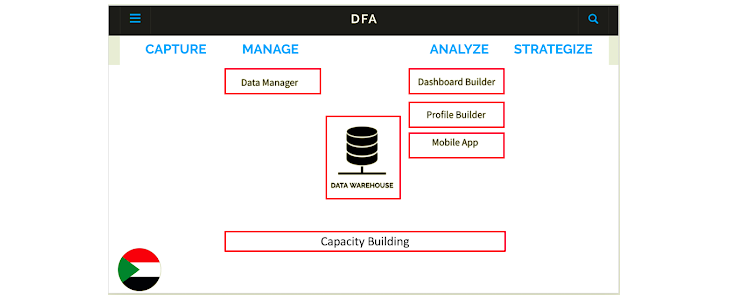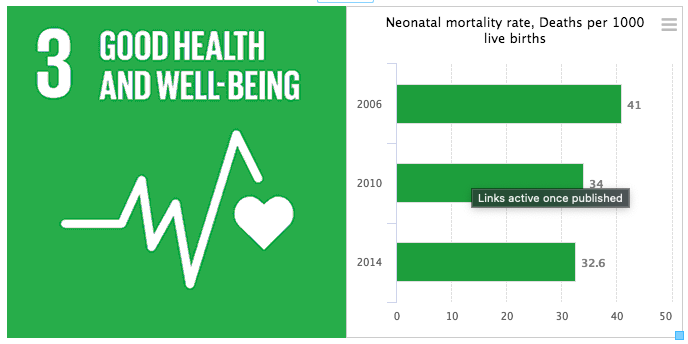|
Jeeveeta Agnihotri, Chief Programme Officer, Community Systems Foundation Seth Davis, Communications Officer, Community Systems Foundation From DevInfo to Data For All In A Data Revolution in Motion, the UN Statistics Division highlights the importance of data tools “to gather, present and disseminate Sustainable Development Goal (SDG) data.” [1] In order to better track progress on national priorities and the SDGs and to create meaningful interventions, however, policy-makers must use these tools efficiently, effectively and extensively. One example of a country utilizing data tools in this way is Sudan. As one of the first country to prepare and launch a tool to monitor progress on the SDGs, Sudan has been at the forefront of fostering greater accountability, transparency and dissemination of of data through its data dashboard. Having collected and managed data for nearly a decade through SudanInfo, an adaptation of DevInfo, Sudan has invested significant resources in strengthening data systems. Technology alone has not led to these solutions. Through capacity building workshops on data management, dissemination, and its use in designing policies, the Central Bureau of Statistics (CBS) now autonomously manages the database and generates reports through data analysis. To improve the system, Sudan has migrated SudanInfo to the Data For All platform. The transition contributed to a more effective management of the database and allowed for enhanced dissemination components that allow for real time data to be made available through multiple interfaces. These include a Sudan SDG data dashboard, a user-friendly mobile application and downloadable profiles from all regions within Sudan. In addition to supporting in the customization of data dissemination tools and trainings, Community Systems Foundation has also supported the CBS’s strategic vision by assisting with the uploading of Multiple Indicator Cluster Survey (MICS) data into SudanInfo. The strategy of the Government of Sudan is to align the database with SDGs and national priorities and encourage the CBS team to work with other line ministries to gain a higher endorsement of SudanInfo by national partners. Technical meetings were conducted with multiple line ministries in order to map sector- and Ministry-specific SDG indicators to demonstrate the importance of and build a commitment to data sharing. UNICEF Sudan has played a key role in supporting the CBS with financial and technical resources over the last decade. This partnership has yielded an important success story of national ownership. At the beginning of the initiative, UNICEF was driving DevInfo implementation; however, over time, CBS has become empowered and has driven the SDG initiative through DFA. Sudan’s Data Dissemination Tools The CBS has developed the SudanInfo SDG Dashboard which focuses on eight priority goals -- education, nutrition, health, protection, environment, food consumption and energy. As other line ministries come on board, the dashboard will be expanded to include a more comprehensive set of goals and indicators. Through the SudanInfo Dashboard, CSF and the CBS collaborated to build a tool that offers reliable access to key performance indicators for the SDGs at the country, regional and district levels. With intuitive visualizations, no trainings are required to use the dashboard. In this regard, by illustrating key trends and gaps for eight SDG categories, the dashboard can be used by a wide range of users. For example, policymakers can understand the progression of national health targets by analysing data presented in the SudanInfo dashboard. When assessing SDG3, Good Health and Well-Being, policymakers can see that improvement in the reduction of Neonatal Mortality Rate (Deaths per 1000 live births) has been gradual over the last decade. From 2006-2010, there was a 7% decrease and between 2010-2014, there was an additional 1.4% drop. From this, we can infer that development interventions have contributed to the reduction in the amount of neonatal deaths in Sudan. Additionally, CSF assisted Sudan in the development of a mobile application. Considering mobile devices have become the default tool to access information in all countries, the SudanInfo mobile application provides users with the opportunity to create data visualizations, including graphs, charts and maps, even in areas with poor internet connection. [2] Within the SudanInfo application, users can also access powerful data profiles that incorporate statistics and visualizations on priority SDG targets. These profiles are fully downloadable and usable offline. This ensure that all users, despite connectivity, are able to use them for enhanced advocacy and easy data dissemination. Conclusion Leveraging capacity developed during the MDG era and through the successful migration of national data to the Data For All platform, countries like Afghanistan, Egypt, Ethiopia, Sudan has been able to successfully develop national SDG data platforms. With seamless transitions and no data loss, the DFA Data warehouse can easily integrate national priorities and SDG goals. At the same time, national statisticians can begin to fulfill the ‘Leave No One Behind’ mandate through the collection and compilation of data on the most vulnerable. Owned and operated by the Central Bureau of Statistics, SudanInfo can be seen as a sustainable model for other countries seeking to enhance national DevInfo databases. This has positioned the country with an integrated national data warehouse for an effective cross-sectorial decision-making platform that aims to monitor SDGs as well as national priorities 1. UN DESA. The Sustainable Development Goals Report 2018: A Data Revolution in Motion. Accessed at: https://unstats.un.org/sdgs/report/2018/data_revolution
2. Community Systems Foundation. UNICEF Sudan 2017. Accessed at: https://www.communitysystemsfoundation.org/portfolio/sudan-mobile-application-and-profiles
0 Comments
Leave a Reply. |
Join the CSF data revolution webinar tomorrow!
COMMUNITY SYSTEMS FOUNDATION – EST 1963
+1 212 500 1335
data-driven sustainable development



